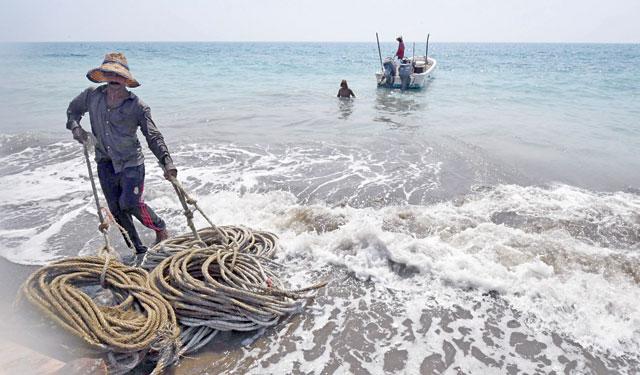You are here
'Iran exceeds enriched uranium stockpile limit'
By AFP - Jul 02,2019 - Last updated at Jul 02,2019
TEHRAN — Iran said Monday it has exceeded a limit on its enriched uranium reserves under a 2015 nuclear deal that has edged towards collapse under Washington's "maximum pressure" campaign.
Israel urged European states to sanction Iran, while Russia voiced regret but said the move was a consequence of US pressure.
Britain called on Tehran "to avoid any further steps away" from the landmark deal, and the UN said Iran must stick to its commitments under the accord.
"Iran has crossed the 300-kilogramme limit based on its plan" announced in May, Foreign Minister Mohammad Javad Zarif told semi-official news agency ISNA.
The United States withdrew from the nuclear deal last year and reimposed biting sanctions on Iran's crucial oil exports and financial transactions as well as other sectors.
Tehran, which has sought to pressure the remaining parties to save the deal, on May 8 announced it would no longer respect the limit set on its enriched uranium and heavy water stockpiles.
It also threatened to go further and abandon more nuclear commitments unless the remaining partners — Britain, China, France, Germany and Russia — helped it to circumvent sanctions, especially to sell its oil.
In further comments Zarif insisted Iran had done nothing wrong. "We have NOT violated the #JCPOA," he Tweeted using an acronym for the nuclear deal.
He said Iran would “reverse” its decision “as soon as E3 abide by their obligations” — referring to the European partners of the deal Britain, France and Germany.
The International Atomic Energy Agency confirmed Iran had exceeded the limit that the deal had imposed on its stockpile of low-enriched uranium (LEU).
The IAEA “verified on July 1 that Iran’s total enriched uranium stockpile exceeded 300 kilogrammes”, a spokesperson said.
A diplomat in Vienna, where the UN’s nuclear watchdog is based, told AFP that Iran had exceeded the limit by two kilogrammes.
‘Don’t dramatise’
Russia and Britain — two of the six world powers that reached the 2015 deal with Iran — were quick to react.
Russia’s deputy foreign minister, Sergei Ryabkov, said Iran’s move was a cause for “regret” but also “a natural consequence of recent events” and a result of the “unprecedented pressure” imposed by the US.
“One mustn’t dramatise the situation,” Ryabkov, whose country is a close ally of Tehran, said in comments reported by Russian news agencies.
Britain’s Foreign Minister Jeremy Hunt said on Twitter that London was “deeply worried” and urged Iran to stop taking any further steps outside the terms of the 2015 nuclear deal and “come back to compliance”.
UN chief Antonio Guterres said it was “essential” that Iran stick to the deal.
Israeli Prime Minister Benjamin Netanyahu demanded urged European countries impose sanctions on his country’s arch-foe Iran.
“You committed yourselves to act as soon as Iran violated the nuclear agreement,” a statement from his office quoted him as saying. “So I say to you: Do it. Just do it.”
‘Europe’s efforts
not enough’
On Friday, the European Union said after a crisis meeting aimed at salvaging the deal that a special payment mechanism set up to help Iran skirt the sanctions, known as INSTEX, was finally “operational” and that the first transactions were being processed.
But “the Europeans’ efforts were not enough, therefore Iran will go ahead with its announced measures”, Zarif said.
INSTEX, which “is just the beginning” of their commitments, has not yet been fully implemented, he added.
The 2015 deal saw Iran commit never to acquire an atomic bomb, to accept drastic limits on its nuclear programme and submit to IAEA inspections in exchange for a partial lifting of crippling international sanctions.
But US President Donald Trump’s unilateral withdrawal from the deal on May 8 last year — and subsequent sanctions — have deprived Iran of the economic benefits it expected and plunged it into recession.
Exactly a year after the US withdrew, President Hassan Rouhani said Iran would temporarily cease to limit its stocks of heavy water and low-enriched uranium.
Iran has also threatened to start enriching uranium above the agreed maximum purification level of 3.67 per cent from July 7. That remains far short of the 90 per cent purity required to build a weapon.
The latest tensions coincide with a buildup of US forces in the Gulf and a series of incidents including Iran’s shooting down of a US drone it claimed had entered its airspace.
Related Articles
WASHINGTON — US President Donald Trump warned Monday that Iran is "playing with fire" after Tehran said it exceeded a limit on enriched uran
TEHRAN — A top Iranian diplomat expressed disappointment on Sunday after meeting a British Foreign Office minister amid escalatin
VIENNA — The head of the UN nuclear agency said on Monday that Iran is complying with obligations limiting uranium enrichment, but two diplo

















